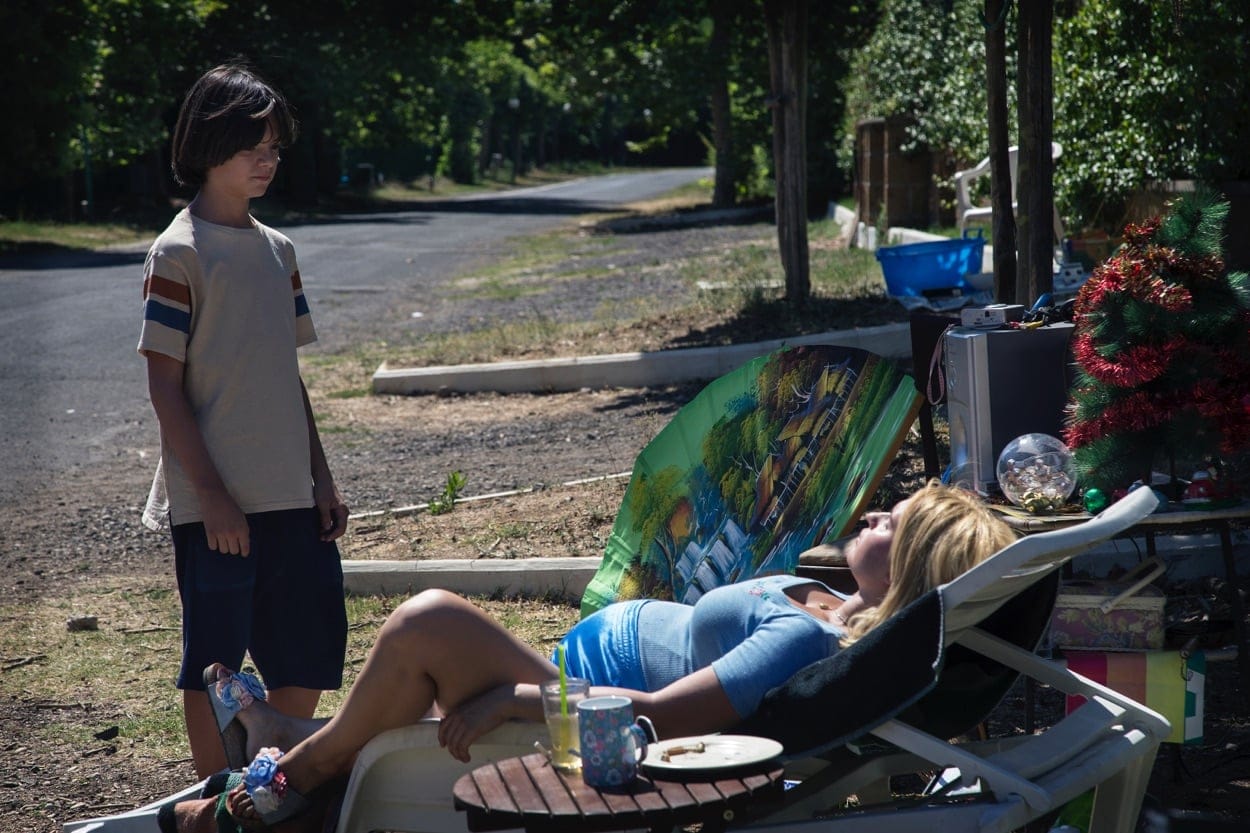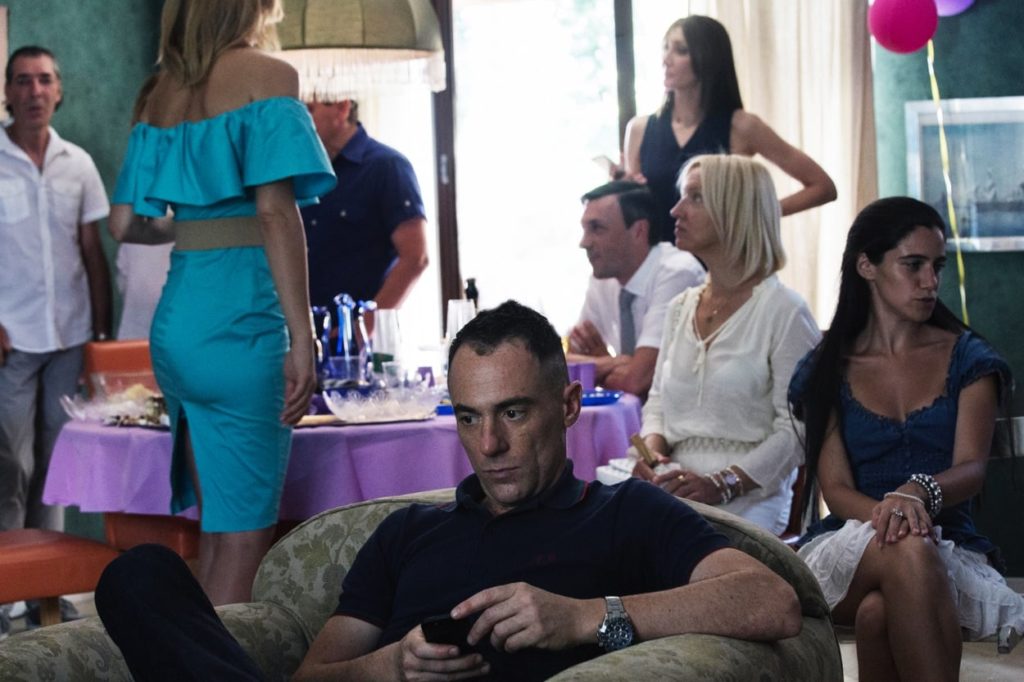Grim and matter of fact, Favolacce follows up the D’Innocenzo brothers’ Boys Cry, a grim and matter of fact mafia drama with a tale, a bad tale (it’s also released as Bad Tales) of kids cusping on teenagerdom living in intolerable family situations.
Asshole dads, toxic family relationship and cowed kids make for a film that’s tough going and yet oddly through-the-fingers watchable. Perhaps because, like frogs being gradually brought up to a simmer, we are introduced to the awfulness by stealth.
To start with it looks like we’re in the world of Raymond Carver. There’s even what looks like a reference to that Carver story Why Don’t You Dance, the one about a yard sale, in one of the quick intros to the main characters. Briskly, rat-tat-tat, we meet the Placido family, two nice kids, Dennis (Tommaso Di Cola) and Alessia (Giulietta Rebeggiani) with a father, Bruno (Elio Germano), who’s anything but placido, a raging asshole who expects the very best from his children, and if it isn’t good enough, the payback is biblical. Over the road the Rosas. Pietro (Max Malatesta) is another dad on a short fuse, there’s a timid daughter, Viola (Giulia Melillo), plus a wife who barely registers, like Mrs Placido.
And up the way, slightly off the grid, lives Geremia (Justin Korovkin) with his winking, nudging, hectoring father, Amelio (Gabriel Montesi), a man we meet driving the family dog away to be put down – it’s rabid – and cheerily chatting about bringing back pizza while shy Geremia looks on too shocked to react.
Plus Vilma (Ileana D’Ambra), heavily pregnant when we first meet her, later a slatternly mother whose neglect of her child confirms what we’ve already guessed – that this pattern is going to carry on repeating down the decades.
The story is mostly told through the eyes of Dennis, Geremia and Viola, the kids bearing the brunt of it in families who would probably never trouble social services but are, nevertheless, out of control, or the fathers are.
Sugaring the pill is the way the D’Innocenzos present Favolacce as a “last summer of innocence” film. The hot summer days, nights balmy and alive with the chirrup of crickets, good-looking kids, some awakening of sexuality. Except everything is a bit off. Dennis, for example, is simply too young to know what sex is, and yet Vilma is offereing him sex instead of giving him €15 change at the yard sale. Later she offers him a squirt of breast milk. Geremia catches measles and so his dad, Amelio (Gabriel Montesi), invites Viola over for a “measles party”, hoping Geremia will use the opportunity to lose his virginity. Geremia is probably 12. Dennis could be younger.
And on it goes, hip-hopping from one family to the next. It’s vaguely reminiscent of The Ice Storm, the way the families mingle and interact, the way precocious sex is used as a marker for other pathologies, though the finger is less obviously pointed at what The Ice Storm would probably have called the permissive society.
Toxic masculinity is what the D’Innocenzos are most interested in, rather than sick families. Over to one side, in a plot strand so subdued it passes almost unnoticed until it detonates like a bomb, is the diffident male schoolteacher using his lessons as a 101 on domestic terrorism.
Todd Solondz used to make films a bit like this: dyspeptic, lively with transgressive sex, in the days of Welcome to the Dollhouse, Happiness and Life During Wartime, but even his darkest films had humour in there, albeit of a stygian sort.
Favolacce is, the grown-up Dennis’s voiceover tells us towards the end after tragedy has done its worst in a shocking finale, a “senseless, sad and pessimistic story”. After a trudge through relentless murk, it sounds like an an apology by the D’Innocenzos. Apology accepted.
Favolacce (Bad Tales) – Watch it/buy it at Amazon
I am an Amazon affiliate
© Steve Morrissey 2021



To comment on the comment, an intelligent, well-written, measured and intellectually honest review. Unfortunately it sins the same way most so-called “film reviews” do: it could’ve easily been just a book review. It deals mostly with the narrative, “the message” and the like, there is almost nothing specifically pertinent to the genre per se, such as for example acting/directing, photography, scenography, etc. And if film is “merely” a narrative, a message and the like, why make films at all? Just publish, and then review, scripts…
Michael, Thanks for the comment. You got me. I have not included enough about what makes this a film as opposed to a book, you’re right. Sometimes I do, other times I get bogged down in the plot.
Steve
Hi Steve
Just saw your reply on IMDb (very late, sorry).
It confirms my first impression of you being an intellectually honest person – nowadays an extreme rarity, almost an oddity. For that alone, all sins are forgiven thee for eternity 🙂
As for reviewing in general, we don’t realise how much have we fallen victim to purportedly universally despised social – not to say “socialist” – realism. … Content, “message”, “lesson:”, “significance”, and the like. Even people reviewing “Finnegan’s Wake” try to do that… Amazing! In my view, reviewing films is the most difficult kind of reviewing, because of the elusiveness of the genre: a film may be almost total pooh in terms of all those “messages”, “lessons” and “significances” (i.e. “Private Jane” [a fascist action movie munching on totally misplaced feminism], or even “Gladiator” [totally superficial even as a cartoon]; etc), and yet it’s so magnificently shot, acted, directed and, yes, written, that you can’t take your eyes off it. In a way, the “directors’ directors” like Ridley or Tony Scott make one review their FILMS… because all the rest in them is rather inch-deep “readers-digest”. For me, Favolacce is a real masterpiece as a Film (with a capital F). But as far as its “sociological message” is concerned, well, believe me, I forgot about those things more than both directors multiplied by ten would ever know; so, t’ain’t what I’m after as a viewer. Naturally, as Geremia’s REAL father, I might be suspected in a bias, but I don’t think so: Favolacce is not Justin’s first film (and not the last), and yet I’m totally impressed by it.
Michael, Better late than never! Like you say, there are many ways to look at these things. In terms of how it was made, what it’s trying to say, the track record of the writer/director, the stars’ baggage, and so on. And then there’s the subjective end – am I in a bad mood today? I’ve not seen any of Justin’s other films. I will look for The Nest – looks interesting. Steve